Which Degree is Right for Me – Engineering or Engineering Technology?
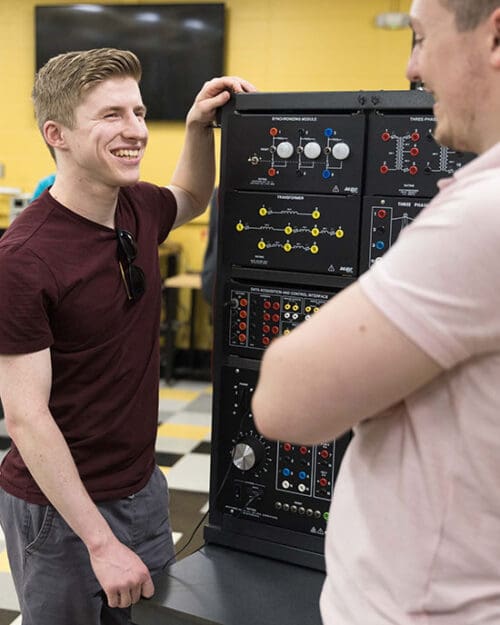
Students with the goal of becoming engineers often choose majors in either Engineering or Engineering Technology.
Engineers and engineering technologists are creative problem-solvers who shape the world through innovation and design. From towering bridges and smart buildings to advanced machines and energy systems, they transform ideas into practical solutions.
Whether it’s constructing a home, developing medical facilities or building sophisticated robotics, their work directly addresses the challenges of everyday life.
While these degrees are closely related, these fields have different focus areas. Each area of study uses different skill sets, academic approaches and leads to distinct career opportunities.
Explore how Purdue University Northwest’s Engineering and Engineering Technology degree paths differ and how you can decide which path is best for you!
Engineering vs Engineering Technology
Engineering graduates often focus on the design, analysis and improvement of systems, while engineering technology graduates focus on the application, operation, testing and maintenance of those systems. Both roles are essential to making technology work in the real world.
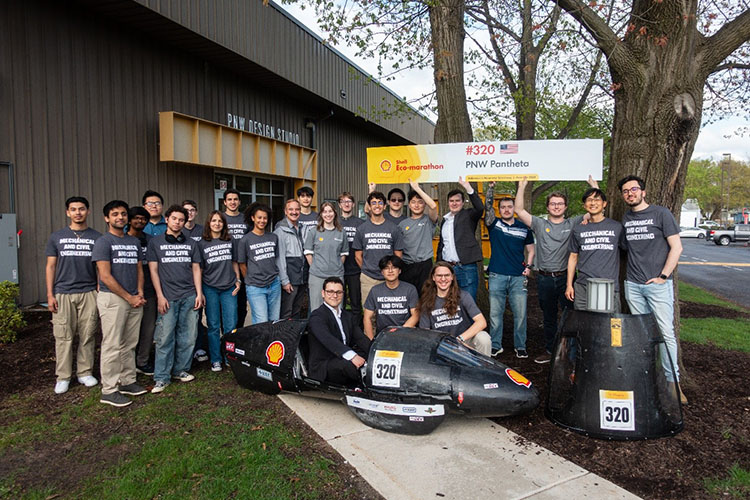
Competitions like the Shell Eco-Marathon allow students to design, build and test vehicles while going head-to-head with students from around the world.
Engineering
A bachelor’s degree in engineering combines advanced mathematics, science and design. As an engineering student, you will use calculus, physics and problem-solving skills to design, develop, analyze and improve systems and structures.
Engineers tackle complex problems by creating, improving and enhancing technologies while also leading the design, development and analysis of projects.
At PNW, engineering students apply what they learn through labs and national competitions. Student teams have:
- designed and raced vehicles in competitions such as SAE Formula, Shell Eco-marathon, and the evGrandPrix electric vehicle challenge
- built award-winning entries for the Steel Bridge and Concrete Canoe competitions
- demonstrated their skills in Field Surveying events
- developed technology for projects like the Mars Rover Challenge and university hackathons.
- These projects give students real-world experience in design, teamwork and innovation.
Engineers may also pursue the Professional Engineer (PE) license. Although not all engineers pursue it, the PE license is especially valuable in areas like civil engineering or consulting. Licensure enhances professional credibility, allows engineers to take legal responsibility for public projects and can expand leadership and career opportunities.
Engineering Degree Specializations
PNW offers a variety of programs in engineering, each with a different area of focus, so you can choose the one that fits your interests.
Civil Engineering
Civil engineers plan, design, and oversee the construction of systems that people use every day, such as highways, water supplies, airports and buildings. Their work helps make communities safe, efficient and sustainable.
Study Civil Engineering at PNW
Where They Work
- Engineering consulting firms
- Construction companies
- Government agencies (city, state, federal transportation or public works)
- Research and development (some civil engineers go into academia or applied research)
Computer Engineering
Computer engineering combines electrical engineering and computer science to create the technology we use every day. It plays a key role in enhancing electronics, improving manufacturing and driving advancements in artificial intelligence, medical devices, robotics, cybersecurity and virtual reality. Computer engineers design the hardware, software and systems that connect our world.
Study Computer Engineering at PNW
Where They Work
- Technology companies (hardware, software and devices)
- Automotive, aerospace and robotics industries
- Health care and medical technology companies
- Cybersecurity and defense organizations
- Research and development centers
Computer science focuses on the theory and practice of computing. Computer scientists design software, develop algorithms and manage data. They create secure, efficient systems that power everything from apps and websites to artificial intelligence and cloud networks.
At PNW, computer science sits within the School of Engineering, giving students strong connections to engineering, mathematics and technology.
Where They Work
- Software and technology companies
- Finance and business services
- Health care and medical technology firms
- Government and defense organizations
- Research and development centers
Electrical Engineering
Electrical engineers use physics, math and programming to design and improve systems that control, monitor and communicate with everything around us. Areas of electrical engineering include computers, control and communication systems, signal processing, robotic systems, power/energy systems and renewable energy technologies that drive modern society.
Study Electrical Engineering at PNW
Where They Work
- Power and energy companies
- Electronics and semiconductor industries
- Aerospace and defense industries
- Manufacturing and automation companies
- Research and development centers
Mechanical Engineering
Mechanical engineering covers areas such as solid mechanics (how materials and structures hold up under forces), thermofluids (heat, energy and fluid flow), machine design (creating and improving machines) and many others.
Mechanical engineers use these skills to design, test and improve systems that involve motion and energy, from engines and turbines to medical devices and renewable energy technologies. Their work helps create efficient, safe and innovative technology.
Study Mechanical Engineering at PNW
Where They Work
- Automotive and aerospace companies
- Manufacturing and industrial firms
- Energy and renewable energy companies
- Health care and medical device industries
- Research and development organizations
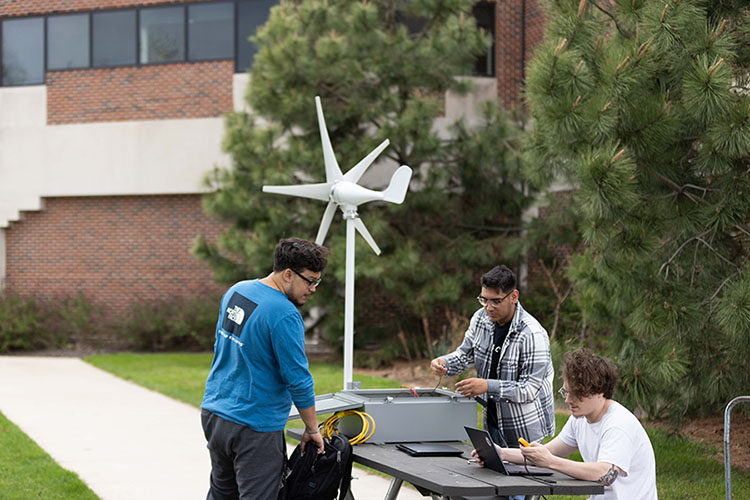
Engineering Technology
A bachelor’s degree in engineering technology is hands-on, focusing on the construction of solutions using a range of technical tools. Engineering technologists bring designs to life, using a variety of tools, software, hardware, algebra and applied calculus.
In the classroom, PNW’s engineering technology courses emphasize the practical application of engineering principles with hands-on labs that have industry-standard equipment. Engineering Technology students design, build, and compete with projects like Hydrabikes, SAE Baja cars and robotics competitions.
An engineering technology degree focuses on applying, testing and maintaining technology in real-world settings, such as manufacturing or construction sites. Students learn to test systems, solve problems and keep processes running smoothly.
Engineering Technology Degree Specializations
PNW offers a variety of academic programs where you can dive into different areas of engineering technology, so you can find a path that matches your interests and career goals.
Construction Management and Engineering Technologists focus on the planning and management side of construction projects. They focus on ensuring that structures such as bridges and roads are built to the proper specifications, ensuring safe, functional and long-lasting features.
Electrical Engineering technologists focus on the application, implementation and maintenance of electrical systems. They use engineering and technical skills to work with electrical systems such as power grids, electronics and motors. They build, collect data from, test and improve electrical equipment used in homes, businesses and factories.
Mechanical Engineering Technologists solve real-world problems by designing, testing, and improving machines and mechanical systems. They can create more efficient HVAC systems for buildings, develop robotic arms for manufacturing or refine engine components in automobiles to boost performance and safety.
Mechatronics Engineering Technologists blend mechanical, electrical and software technologies to create and build new systems in the manufacturing industry. They focus on automation, robotics and smart machines to design, build and maintain smart systems and automated processes.
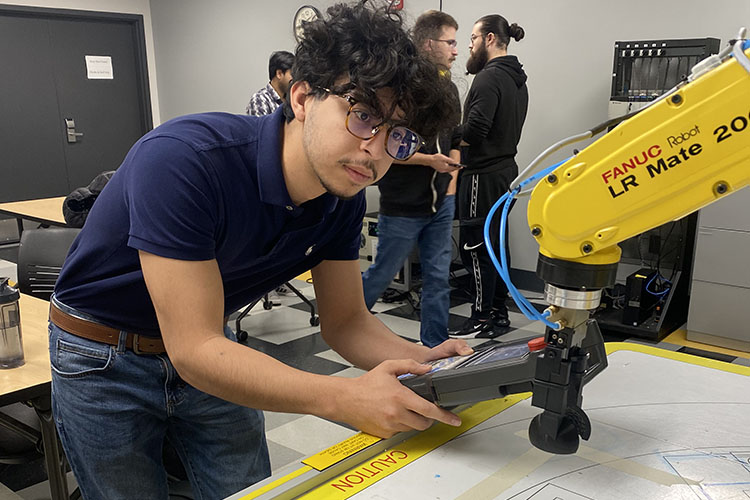
Which degree is right for me?
Both Engineering and Engineering Technology lead to great careers. The best choice depends on how you like to learn and work.
Engineering
You enjoy math and science and like solving big and complex problems. Engineers design, innovate, analyze and improve systems.
Engineering Technology
You like learning by doing and working with tools, equipment and software. ET focuses on building, testing, maintaining, and improving systems.
Professional Connections
Build your network through student chapters of groups like the American Society of Civil Engineers, American Society of Mechanical Engineers, Institute of Electrical and Electronics Engineers (IEEE), IEEE- HKN (Eta Kappa Nu), the National Society of Black Engineers, the Society of Hispanic Professional Engineers and the Society of Women Engineers. These memberships give you access to mentors, internships, jobs and leadership opportunities.
You can also build your professional network through Purdue Northwest’s Alumni Office, which offers career resources, events and networking with graduates in your field.
Modern Labs and Facilities
Learn in spaces like the PNW Design Studio, the Commercialization and Manufacturing Excellence Center and the Roberts Impact Lab. These facilities are equipped with industry-standard tools and technology, so you’ll graduate already confident in the equipment used on the job.

Undergraduate Research
Students can get involved in research early, working with faculty on real-world problems. At PNW, undergraduates contribute to projects in the Center for Cybersecurity, the Center for High-Energy Physics collaborations, the Center for Innovation through Visualization and Simulation, the Energy Efficiency and Reliability Center and the Water Institute.
These opportunities provide students with exposure to cutting-edge fields such as cybersecurity, particle physics, advanced manufacturing, renewable energy and ecological sustainability. Many students present their findings at conferences, earn summer placements and gain an advantage for both jobs and graduate school.
Hands-On Projects and Competitions
Join student organizations that turn classroom learning into real-world challenges. Compete in Formula SAE, the Shell Eco-marathon, evGrandPrix, Steel Bridge, Concrete Canoe, NCES Surveying competition, Baja Motorsports, Hydrabike, robotics contests, campus hackathons, cybersecurity contests and more. These projects give you teamwork, leadership, and innovation experience that employers value.
Career-Ready Skills
PNW students graduate ready to step into the workforce. By working with industry-standard tools, labs and software, they gain the technical know-how employers expect. Through team projects, competitions and internships, students also build the communication, leadership and problem-solving skills that make them stand out.
This combination of hands-on training and professional experience means PNW graduates enter internships and full-time careers with confidence, often needing little or no extra training. The PNW Career Center also supports this journey by connecting students with employers, offering resume help, interview prep, and career coaching to ensure they’re ready to succeed.
At PNW, you won’t just prepare for a career, you’ll practice it, with the support of faculty, peers and industry partners.
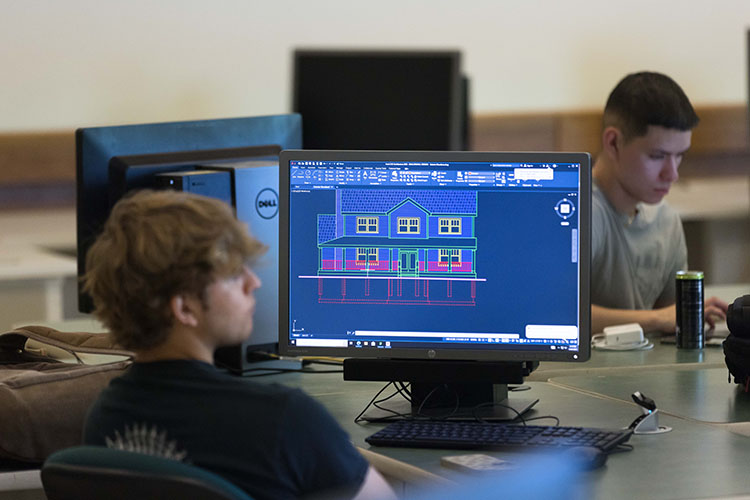
Engineering and Engineering Technology Degrees At PNW
PNW offers a variety of undergraduate and graduate Engineering and Engineering Technology degrees. Whether you are looking to major, minor or receive a certificate, there is a program for you!